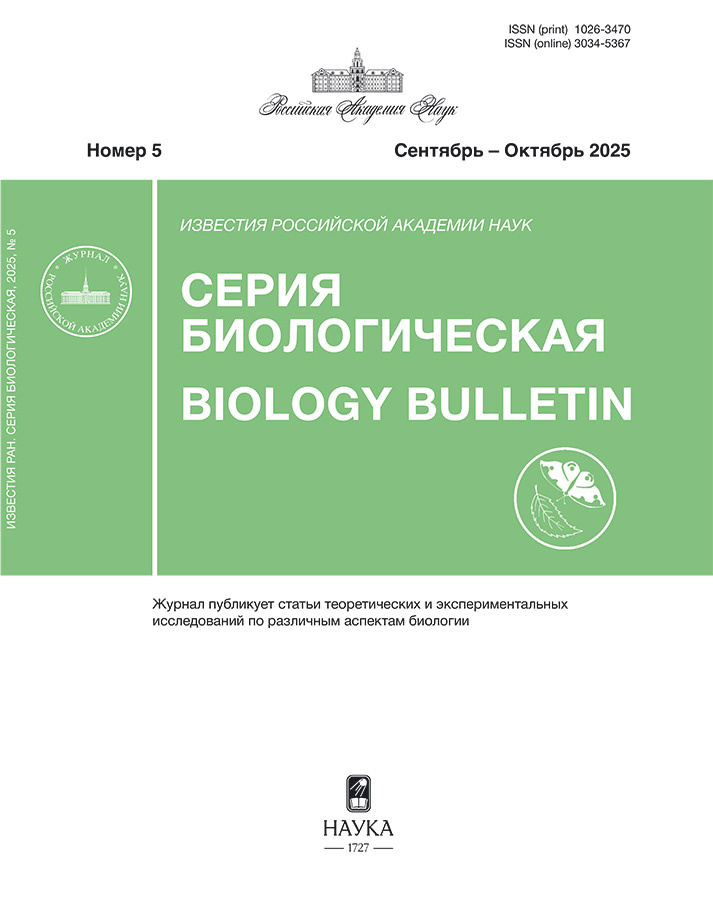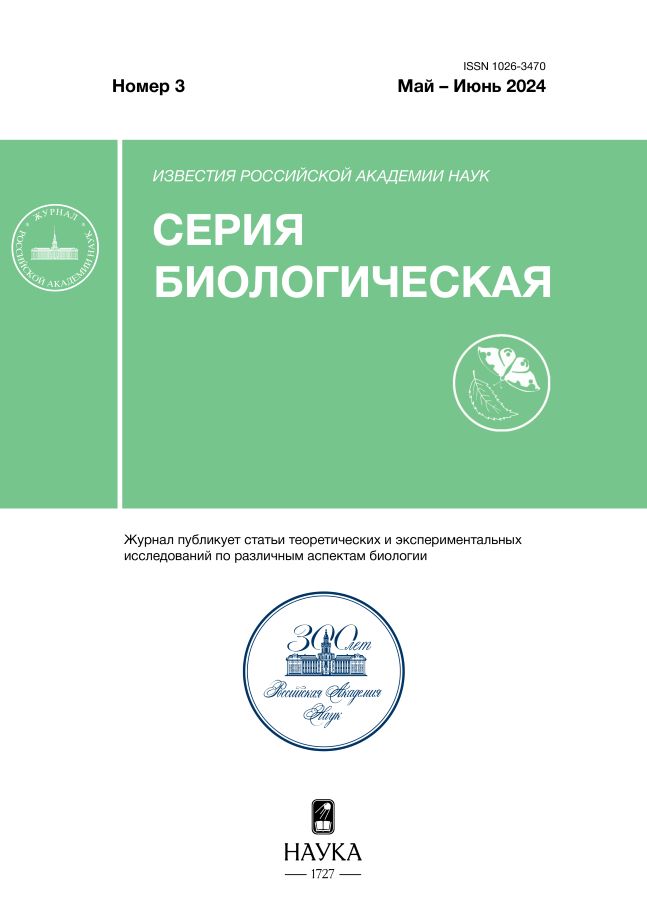Решительность как индивидуальная черта поведения в природной популяции птиц
- Авторы: Ильина Т.А.1, Киселева А.В.1, Бушуев А.В.1, Иванкина Е.В.1, Керимов А.Б.1
-
Учреждения:
- Московский государственный университет имени М.В. Ломоносова
- Выпуск: № 3 (2024)
- Страницы: 336-345
- Раздел: ЗООЛОГИЯ
- URL: https://cijournal.ru/1026-3470/article/view/647793
- DOI: https://doi.org/10.31857/S1026347024030053
- EDN: https://elibrary.ru/VAVEXO
- ID: 647793
Цитировать
Полный текст
Аннотация
Индивидуальную решительность при возобновлении кормления птенцов выявляли в тестах с предъявлением незнакомого объекта у гнезд мухоловки-пеструшки (Ficedula hypoleuca) в естественной среде. В течение четырех гнездовых сезонов было протестировано 229 особей, из которых 41 — от 2 до 4 раз. Повторное тестирование одних и тех же птиц проводили на разных гнездах с интервалами от 3 до 1103 дней (Med=367). Контролировали число и возраст птенцов, сроки гнездования, пол и возраст особи и ее партнера, наличие линьки, интенсивность кормления птенцов и поведение партнера, а также наличие одновременной бигамии у самца. Выявлена достоверная повторяемость результатов тестирования на значительных интервалах времени (R=0.21), что свидетельствует об устойчивости во времени индивидуальной реакции (решительности) особи на фоне меняющихся условий естественной среды.
Ключевые слова
Полный текст
Об авторах
Т. А. Ильина
Московский государственный университет имени М.В. Ломоносова
Автор, ответственный за переписку.
Email: ilyina@mail.bio.msu.ru
Россия, Москва
А. В. Киселева
Московский государственный университет имени М.В. Ломоносова
Email: ilyina@mail.bio.msu.ru
Россия, Москва
А. В. Бушуев
Московский государственный университет имени М.В. Ломоносова
Email: ilyina@mail.bio.msu.ru
Россия, Москва
Е. В. Иванкина
Московский государственный университет имени М.В. Ломоносова
Email: ilyina@mail.bio.msu.ru
Россия, Москва
А. Б. Керимов
Московский государственный университет имени М.В. Ломоносова
Email: ilyina@mail.bio.msu.ru
Россия, Москва
Список литературы
- Васильева Н.А. Синдром темпа жизни (pace-of-life syndrome, POLS): эволюция концепции // Зоологический журнал. 2021. Т. 100. № 9. С. 969—983. doi: 10.31857/S0044513421090117
- Высоцкий В.Г. Определение возраста у мухоловок-пеструшек Ficedula hypoleuca в период размножения // Труды Зоологического института АН СССР. 1989. Т. 197. С. 49—52.
- Гриньков В.Г. Условия стабильного поддержания фенотипической структуры популяции на примере изменчивости окраски брачного наряда у самцов мухоловки-пеструшки (Ficedula hypoleuca Pall.): Автореф. дис. канд. биол. наук. М.: МГУ, 2000. 24 с.
- Дольник В.Р. Ресурсы энергии и времени у птиц в природе // Труды Зоологического института РАН. 1995. Т. 179. С. 1—360.
- Ильина Т.А., Иванкина Е.В., Керимов А.Б. Роль социального фактора в освоении новой среды у большой синицы (Parus major) в условиях ограниченного пространства // Зоологический журнал. 2010. Т. 89. № 9. С. 1131—1138.
- Ильина Т.А., Киселева А.В., Беляков В.В., Еланская А.С., Паллак А.М., Уварова М.А., Устинова Д.А. Поведенческие типы у птиц и их выявление в природных условиях на примере мухоловки-пеструшки // Орнитология. 2022. Т. 46. С. 5—12. doi: 10.56658/04747313_2022_46_5
- Ильина Т.А., Крупицкий А.В., Бушуев А.В. Связь успешности межвидового выкармливания птенцов с шириной трофической ниши вида-реципиента у птиц-дуплогнездников // Зоологический журнал. 2019. Т. 98. № 6. С. 649—664. doi: 10.1134/S0044513419060072
- Керимов А., Иванкина Е., Шишкин В. Неустойчивый половой диморфизм и параметры размножения мухоловки-пеструшки // Орнитология. 1994. Т. 26. С. 13—27.
- Керимов А.Б., Роговин К.А., Иванкина Е.В., Бушуев А.В., Соколова О.В., Ильина Т.А. Специфический иммунитет и полиморфизм брачного наряда самцов мухоловки-пеструшки, Ficedula hypoleuca (Aves: Passeriformes) // Журнал общей биологии. 2012. Т. 73. № 5. С. 349—359.
- Котеров А.Н., Ушенкова Л.Н., Зубенкова Э.С., Калинина М.В., Бирюков А.П., Ласточкина Е.М., Молодцова Д.В., Вайнсон А.А. Сила связи. Сообщение 2. Градации величины корреляции // Медицинская радиология и радиационная безопасность. 2019. Т. 64. № 6. С. 12—24. doi: 10.12737/1024-6177-2019-64-6-12-24
- Минина М.А., Телегина Я.Р., Друзяка А.В., Зотов А.Ю. Влияние условий раннего развития на формирование индивидуальных поведенческих характеристик у птенцов озерной чайки (Larus ridibundus) // Орнитология: история, традиции, проблемы и перспективы. Материалы Всероссийской конференции, посвященной 120-летию со дня рождения профессора Г. П. Дементьева. М.: Товарищество научных изданий КМК, 2018. С. 246—253.
- Шилов И.А. Эколого-физиологические основы популяционных отношений у животных. М.: Изд-во Московского университета, 1977. 262 с.
- Шилов И.А. Экология. М.: Высшая школа. 2001. 512 с.
- Шилов И.А., Каменов Д.А., Маслов С.П. Значение основных свойств нервной системы в становлении иерархической структуры в однополых группах домовых мышей // Зоол. журн. 1974. Т. 43. № 10. С. 1548—1555.
- Bairlein F. Manual of field methods. European-African songbird migration network // Institut für Vogelforschung, Wilhelmshaven. 1995. 32 pp.
- Bates D., Mächler M., Bolker B., Walker S. Fitting linear mixed-effects models using lme4 // Journal of Statistical Software. 2015. V. 67. № 1. P. 1—48.
- Beckmann C., Biro P.A. On the validity of a single (boldness) assay in personality research // Ethology. 2013. V. 119. № 11. P. 937—947. doi: 10.1111/eth.12137
- Bell A.M., Hankison S.J., Laskowski K.L. The repeatability of behaviour: a meta-analysis // Animal behaviour. 2009. V.77. № 4. P. 771—783. doi: 10.1016/j.anbehav.2008.12.022
- Both C., Dingemanse N.J., Drent P.J., Tinbergen J.M. Reproductive success and Great Tit personalities // Natural Selection and Avian Personality in a Fluctuating Environment. 2003. P. 59—70.
- Burtt H.E., Giltz M.L. Personality as a variable in the behavior of birds // The Ohio Journal of Science. 1973. V.73. № 2. P. 65—82.
- Bushuev A., Zubkova E., Tolstenkov O., Kerimov A. Basal metabolic rate in free-ranging tropical birds lacks long-term repeatability and is influenced by ambient temperature. // Jornal of Experimental Zoology. 2021 V. 335. P. 668—677. doi: 10.1002/jez.2532
- Dingemanse N.J., Both C., Drent P.J., Van Oers K., Van Noordwijk A J. Repeatability and heritability of exploratory behaviour in great tits from the wild // Animal behaviour. 2002. V. 64. № 6. P. 929—938. doi: 10.1006/anbe.2002.2006
- Dingemanse N.J., de Goede P. Winter dominance and avian personality in the wild // Natural selection and avian personality in a fluctuating environment. 2003. P. 33—46.
- Dingemanse N.J., Wolf M. Recent models for adaptive personality differences: a review // Philosophical Transactions of the Royal Society B: Biological Sciences. 2010 V. 365. № 1560. P. 3947—3958. doi: 10.1098/rstb.2010.0221
- Drent P.J., van Oers K., van Noordwijk A.J. Realized heritability of personalities in the great tit (Parus major) // Proceedings of the Royal Society of London Series B: Biological Sciences. 2003 V. 270. № 1510. P. 45—51. doi: 10.1098/rspb.2002.2168
- Forsman A. Rethinking phenotypic plasticity and its consequences for individuals, populations and species // Heredity. 2015. V. 115. № 4. P. 276—284. doi: 10.1038/hdy.2014.92
- Garamszegi L.Z., Markó G., Herczeg G.A. Meta-analysis of correlated behaviours with implications for behavioural syndromes: mean effect size, publication bias, phylogenetic effects and the role of mediator variables // Evolutionary Ecology. 2012. V. 26. № 5. P. 1213—1235. doi: 10.1007/s10682-012-9589-8
- Garamszegi L.Z., Mueller J.C., Markó G., Szász E., Zsebök S., Herczeg G., Eens M., Török J. The relationship between DRD4 polymorphisms and phenotypic correlations of behaviors in the collared flycatcher // Ecology and evolution. 2014. V. 4. № 8. P. 1466—1479. doi: 10.1002/ece3.1041
- Groothuis T.G., Carere C. Avian personalities: characterization and epigenesis // Neuroscience & Biobehavioral Reviews. 2005. V. 29. № 1. P. 137—150. doi: 10.1016/j.neubiorev.2004.06.010
- Herborn K.A., Macleod R., Miles W.T., Schofield A.N., Alexander L., Arnold K.E. Personality in captivity reflects personality in the wild // Animal Behaviour. 2010. V. 79. № 4. P. 835—843. doi: 10.1016/j.anbehav.2009.12.026
- Houston A.I. Evolutionary models of metabolism, behaviour and personality // Philosophical Transactions of the Royal Society B: Biological Sciences. 2010. V. 365. № 1560. P. 3969—3975. doi: 10.1098/rstb.2010.0161
- Kerimov A.B., Ilyina T.A., Ivankina E.V., Bushuev A.V., Sokolova O.V., Rogovin K.A. Melanin-based coloration and immunity in polymorphic population of pied flycatcher, Ficedula hypoleuca // Evolutionary ecology. 2018. V. 32. P. 89—111. doi: 10.1007/s10682-017-9926-z
- Kluen E., Brommer J.E. Context-specific repeatability of personality traits in a wild bird: a reaction-norm perspective // Behavioral Ecology. 2013. V. 24. № 3. P. 650—658. doi: 10.1093/beheco/ars221
- Kluen E., Kuhn S., Kempenaers B., Brommer J.E. A simple cage test captures intrinsic differences in aspects of personality across individuals in a passerine bird // Animal Behaviour. 2012. V. 84. № 1. P. 279—284. doi: 10.1016/j.anbehav.2012.04.022
- Koolhaas J., Korte S., De Boer S., Van Der Vegt B., Van Reenen C., Hopster H., De Jong I.C., Ruis M.A.W., Blokhuis H.J. Coping styles in animals: current status in behavior and stress-physiology // Neuroscience & Biobehavioral Reviews. 1999. V. 23. № 7. P. 925—935.
- Kuznetsova A., Brockhoff P.B., Christensen R.H.B. lmerTest package: tests in linear mixed effects models // Journal of Statistical Software. 2017. V. 82. № 13. P. 1—26. doi: 10.18637/jss.v082.i13
- Lüdecke D., Makowski D., Waggoner P., Patil I. Performance: Assessment of Regression Models Performance. R package v. 0.6.0. 2020. https://easystats.github.io/performance/egression models performance.
- Lundberg A., Alatalo R. V. The Pied Flycatcher. London: T. and A. D. Poyser, 1992. 267 p.
- Murren C.J., Auld J.R., Callahan H., Ghalambor C.K., Handelsman C.A., Heskel M.A., Kingsolver J.G., Maclean H.J., Masel J., Maughan H., Pfennig D.W., Relyea R.A., Seiter S., Snell-Rood E., Steiner U.K., Schlichting C.D. Constraints on the evolution of phenotypic plasticity: limits and costs of phenotype and plasticity // Heredity. 2015. V. 115. № 4. P. 293—301. doi: 10.1038/hdy.2015.8
- Nakagawa S., Schielzeth H. Repeatability for Gaussian and non‐Gaussian data: a practical guide for biologists // Biological Reviews. 2010. V. 85. № 4. P. 935—956. doi: 10.1111/j.1469—185X.2010.00141.x
- Nakagawa S., Schielzeth H.A. General and simple method for obtaining R2 from generalized linear mixed‐effects models // Methods in ecology and evolution. 2013. V. 4. № 2. P. 133—142. doi: 10.1111/j.2041-210x.2012.00261.x
- Pusch E.A., Navara K.J. Behavioral phenotype relates to physiological differences in immunological and stress responsiveness in reactive and proactive birds // General and Comparative Endocrinology. 2018. V. 261. P. 81—88. doi: 10.1016/j.ygcen.2018.01.027
- Quinn J.L., Cresswell W. Personality, anti-predation behaviour and behavioural plasticity in the chaffinch Fringilla coelebs // Behaviour. 2005. V. 142. № 9—10. P. 1377—1402.
- Réale D., Reader S.M., Sol D., McDougall P.T., Dingemanse N.J. Integrating animal temperament within ecology and evolution // Biological reviews. 2007. P. 82. № 2. P. 291—318. doi: 10.1111/j.1469—185X.2007.00010.x
- Sih A., Bell A.M., Johnson J.C., Ziemba R.E. Behavioral syndromes: an integrative overview // The Quarterly Review of Biology. 2004. V. 79. № 3. P. 241—277.
- Stoffel M.A., Nakagawa S., Schielzeth H. rptR: Repeatability estimation and variance decomposition by generalized linear mixed‐effects models // Methods in ecology and evolution. 2017. V. 8. № 11. P. 1639—1644. doi: 10.1111/2041-210X.12797
- Timm K., Tilgar V., Saag P. DRD4 gene polymorphism in great tits: gender-specific association with behavioural variation in the wild // Behavioral Ecology and Sociobiology. 2015. V. 69. № 5. P. 729—735. doi: 10.1007/s00265-015-1887-z
- Van Oers C. H.J. On the genetics of avian personalities: mechanism and structure of behavioural strategies in the great tit (Parus major): PhD Thesis. Utrecht: Universiteit van Utrecht, 2003. 136 pp.
- Van Oers K., Drent P.J., De Goede P., Van Noordwijk A.J. Realized heritability and repeatability of risk-taking behaviour in relation to avian personalities // Proceedings of the Royal Society of London Series B: Biological Sciences. 2004. V. 271. № 1534. P. 65—73. doi: 10.1098/rspb.2003.2518
- Van Oers K., Drent P.J., Dingemanse N.J., Kempenaers B. Personality is associated with extrapair paternity in great tits, Parus major // Animal Behaviour. 2008. V. 76. № 3. P. 555—563. doi: 10.1016/j.anbehav.2008.03.011
- Van Oers K., Klunder M., Drent P.J. Context dependence of personalities: risk-taking behavior in a social and a nonsocial situation // Behavioral Ecology. 2005. V. 16. № 4. P. 716—723. doi: 10.1093/beheco/ari045
- Verbeek M.E., Boon A., Drent P.J. Exploration, aggressive behaviour and dominance in pair-wise confrontations of juvenile male great tits // Behaviour. 1996. V. 133. № 11—12. P. 945—963.
- Verbeek M.E., Drent P., De Goede P., Wiepkema P. Individual behavioural characteristics and dominance in aviary groups of great tits // Behaviour. 1999. V. 136. № 1. P. 23—48.
- Vrublevska J., Krama T., Rantala M. J., Mierauskas P., Freeberg T.M., Krams I.A. Personality and density affect nest defence and nest survival in the great tit // Acta ethologica. 2015. V. 18. P. 111—120. doi: 10.1007/s10211-014-0191-7
Дополнительные файлы












